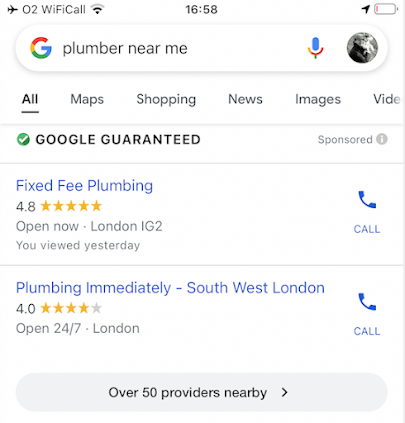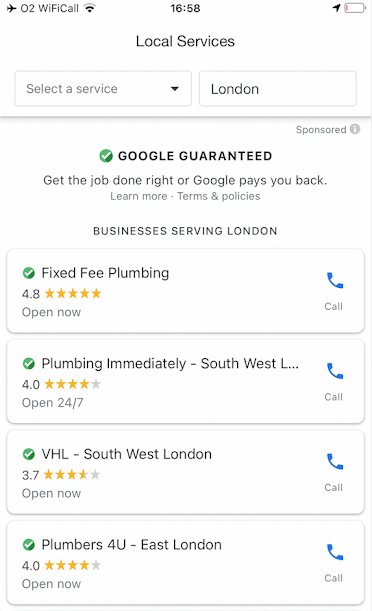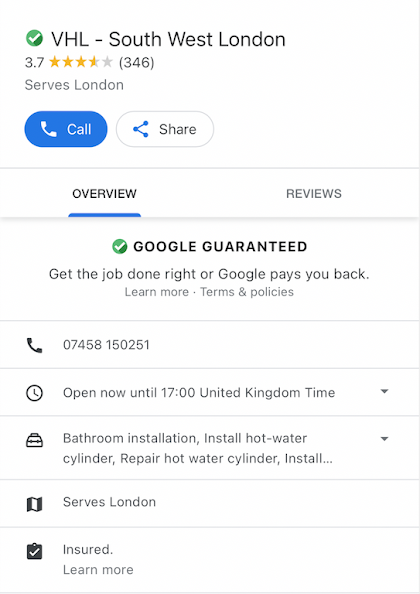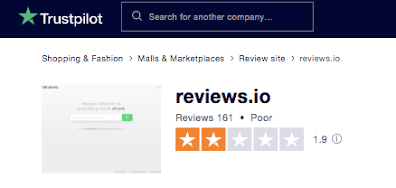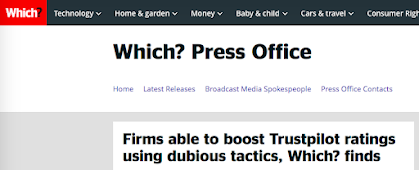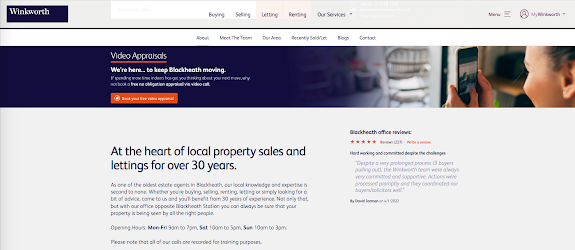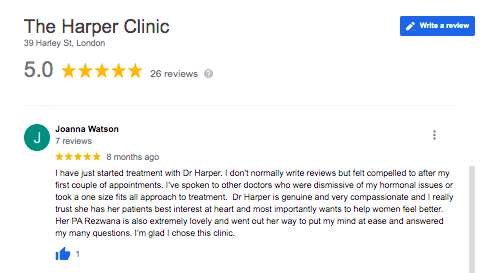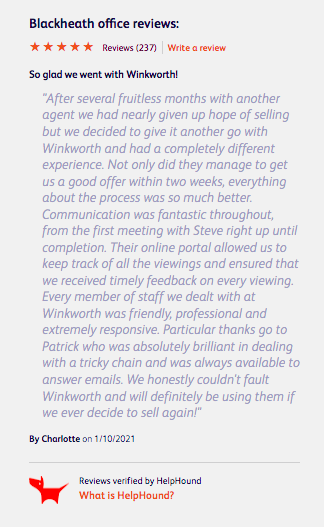Anyone who has conducted a local search recently will have seen Google's clever new offering: here's a common enough example:
Monday, 31 January 2022
Google Local Ads and the Google Guarantee - a moneyspinner for Google and the death knell for review sites?
Monday, 17 January 2022
By far the best way for service and professional businesses to get the maximum benefit from reviews
Reviews have been around for nearly two decades now, but businesses remain confused, and understandably so. This article is designed to end that confusion, once and for all.
But first, let's look at why businesses engage with reviews in the first place:
- Consumers - just about all consumers - check reviews before even considering a particular product or service purchase nowadays; businesses with negative reviews or low scores suffer, businesses with great reviews and high scores prosper
- Businesses know that, so they want their reviews and scores to look their very best in search, irrespective of how the consumer may have come across them in the first place; it may be they've been recommended by a friend or colleague or seen some of the business's other marketing efforts, but they'll still reference the business's reviews
- Businesses are aware that their competitors understand the above two points and will be doing their very best to win the reviews race
So now the Google reviews solution is looking less straightforward: how to demonstrate compliance with the law and, at the same time, maintain that flow of high-quality positive reviews? We all know that customers - for we are they when not wearing our 'work' hats - can be unreasonable, ill-informed, unfair, inaccurate in our recall of events and sometimes just plain wrong. How to play the reviews game without our business's reputation being harmed unfairly?Then along came Google. And in many ways life became simpler: you just wanted your business - your product or service - to look great in search. But then you realised that, unlike the 'old media', you couldn't be sure that your potential customer would see you at all. At least with a newspaper or magazine you could be sure they would turn the page and there your ad would be, or the same for TV in a commercial break. But with Google we all soon realised that appearing on page 2 of search was akin to promoting one's business in Timbuktu.Google, luckily for all of us, was pretty quick to understand that this benefitted neither business nor consumer (although it sure sold a lot of Google ads!). So they introduced reviews.Google reviews, after a sluggish start, partly because they were initially parked alongside Maps in Google Places, became the world-recognised benchmark for businesses as soon as they began being displayed in every search. If your business scored as close to the perfect 5.0 as possible and was shown on page 1 of search the enquiries and business would flow. If you scored less well and/or didn't appear on page 1 you needed to take action.Let's deal with the page 1 part first: any SEO agency would quite happily take £thousands of your hard-earned and promise you the earth. Stories of SEO horror used to be legion. Then Google introduced the Google My Business panel and let businesses and their web designers know that if they 'played the game' there - by providing the information Google knew searchers wanted - they would rank higher; no guarantees, but better than paying out thousands for paltry results.Then came reviews - and the Google reviews filter. So businesses went after reviews - positive reviews - to get both their scores and their absolute numbers of reviews up. The Google filter, when enabled by a searcher, simply displayed only businesses that scored 4.5 and up - after all, who would be looking for a business that scored less, right?Hot on the heels of this quest came hitch No 1: regulatory abuse. In the UK and the EU the law quickly caught up and stated - and still states today - that it would be illegal to only invite happy customers to write reviews (known as cherry-picking) and it would be even less desirable for businesses to come up with mechanisms to get only - or even mainly - positive reviews (known as gating).
Well, the salesforces of the review sites, which had been around since way before Google reviews (which, in themselves, have never been actively 'sold' by Google), had their pitches honed: ignore Google reviews and focus on theirs. Not only would they display your reviews on their sites, Google would list links to them in search - well, somewhere in search - and they would give you wonderful dashboards to share with your marketing teams. Crucially, they would also be as 'helpful' as possible when it came to 'managing' negative reviews.The problems here - apart from the prominence of their brands in online retail marketing, where they were and are ubiquitous - were straightforward:
1. They just did not show up sufficiently in search, certainly by comparison with Google reviews. Go on: google any business and see whose reviews show. Google's reviews are right there every time.
2. They have attracted increasingly negative reviews of their own - just search for Trustpilot on Reviews.io or vice versa and you will see what we mean.
3. Negative mainstream media coverage has followed; the last thing any business needs is the credibility of their reviews platform being called into question.
4. Legal and compliance issues are enough to keep any corporate compliance officer continually at odds with their sales and marketing colleagues, as well as awake at night: 'We can't use/abuse customer reviews in that way!' - 'If we don't we'll look worse than our competitors.' 'But that's illegal.' 'How can we compete if we don't?'
- visibility
- credibility
- SEO credit
- longevity
- owning your own reviews - not possible with either Google or the review sites
- moderation - having your customers' reviews checked for factual accuracy and potentially misleading statements before publication
1. Does looking great on Google matter to us (you might be surprised how many answer 'No' to that question - online retailers, large 'monopolies' - think mobile phone/utilities)? If the answer is 'yes' - as it should be for all service and professional businesses - then please read on. For businesses that already have Google reviews please pay especial attention to point 2.2. Does compliance with the law matter? We apologise for even asking this question but still, in 2022, at last half the businesses we speak to are horrified to find that they are unwittingly breaking the law - usually by cherry-picking or gating. The detail is here, but if your business is at all vulnerable to a well-written malicious review - and all service or professional businesses are - we suggest that a moderated review management system (see 3. below) is absolutely essential.Just speak to any business that has been a victim of such a review or read this article about a law firm that ended up having to sue one of its own clients because the review they had written was costing them tens of thousands in lost fees (as the judge in the case agreed).3. If looking great on Google matters - score and volume - do negative reviews that are inaccurate, misleading or just plain unfair matter? Of course they do - everyone reads them, and they're the single main reason some businesses are afraid of engaging with Google reviews (as well as being the single main reason that a searcher won't click through to a business's website). You need an independently moderated review management system that checks every single review before it's published. Moderation is explained here.4. Does ranking on Google matter? Do we need to rank high in search and look good there as well? This question is probably best answered graphically; here is a local search that features one of our clients:
Price? Almost certainly less than the firm's daily petrol bill - per month! And no contract - ever.
Monday, 10 January 2022
HelpHound - Blog Index for 2022
There are now nearly 1,000 articles on this blog now, so we thought it might be helpful if we provide an index of 'essential reading'.
If you cannot find the answer to your own query here you have three options...
- Call us - a quick call to 020 7100-2233 will resolve any questions you may have
- Email us - info@helphound.com
- Interrogate the blog - on the right you will see 'Search this blog'. Just type in a keyword or words and you may well find what you are looking for. If you still haven't found the answer we really need to hear from you, so please let us know!
- Depending on the extent of your business's engagement with the most important, visible and influential reviews host of all: Google.
- Depending on your experience with other review solutions: review sites, aggregators and so on.
- Sector-specific articles: legal, medical, financial etc.
- Results. Saving the best for last: what will happen when your review management programme is correctly implemented and kicks into gear.
Very few businesses in 2022 have no Google reviews. If one has none or very few this is invariably as a result of the justifiable fear of attracting inaccurate, misleading or just plain unfair reviews.
- If this is the case this is the article for you. It maps the route your business will need to take to eliminate that 'fear factor' without, as is the case with so many businesses these days, flying in the face of the law.
In some ways this business is in an enviable position: once it adopts a review management strategy it will be in a position to measure its success very accurately indeed. After all, any uplift in clicks and calls post-implementation will be startlingly obvious and will almost certainly be attributable to one factor: their new review management strategy.
It is very common for a business to invite its most loyal customers and connexions to write reviews, and then run out of steam. This is completely understandable but - wait for it - illegal (at least in the UK). So how to comply with the law and the regulations and get more reviews at the same time?
- Everything you need to know about compliance with the CMA regulations is here. Non-compliance doesn't simply mean risking a fine and the attendant damaging publicity but also hands your competitors a stick to beat you with: 'Oh. you're considering Smith & Co? It's a pity their reviews are gained illegally.'
Compliance won't hold you back - quite the opposite - or expose you to risk but it will mean you and your staff will be able to sleep at night.
Again, the first step must be compliance. 'Cherry-picking' (selecting happy customers and then inviting them to write a Google review) and 'Gating' (sending a customer survey or using a little known reviews site to establish who your happy customers are and then inviting them - and only them - to write a review to Google) are both against the law; the latter is also against Google terms of service and, if detected, will result in all the business's reviews being removed.
- Read this. It will reassure you that your business can reap all the rewards that come with having an impressive Google score alongside many great reviews and be bullet-proof when it comes to complying with the law.
- Here's an article that specifically deals with gating. Imagine having dozens - or even hundreds - of great Google reviews and then losing them all overnight? That's what Google does to businesses it identifies as gating. No redress. No appeal. It's simply not worth the effort, especially when there's a legitimate alternative.
Both these articles will help explain why there's no need to cherry-pick or gate; adopting professional review management will protect and enhance your business's reputation, legally.
See if yours is the kind of business - multi-line online retail, for instance - that can benefit from membership of a review site. And see why service businesses and the professions need a Google-focussed review management programme instead.
- What happens when you move from an off-the-peg review site to professional review management (besides a fall in cost!).
Whilst they look great, in theory, aggregators - sites that scour the web for reviews of your business and then display them on your website - have considerable downsides once you look under the bonnet.
Now for some sector-specific articles containing examples and advice:
The following professions are amongst those that most resisted review management back in the early days. Their logic - understandable, given that it takes years to build a reputation and one well-written negative review can undo all that work - was that...
- Their sphere of operations was complex and difficult for a lay person - their client or patient in these cases - to understand.
- Client - or patient - confidentiality was one of the cornerstones of their modus operandi; asking someone to effectively break that to write a review would be a bridge too far for many.
- Clients - and patients - would be extremely reluctant to reveal details of their personal experiences.
- Complexity: providing their reviews are moderated clients and patients are capable of writing extremely helpful and reassuring reviews that are hugely welcomed by prospective clients and patients.
- Confidentiality: the key here is to stress that writing the review is entirely at the client or patient's discretion. Those that are happy to write a review will do so, those that are not won't. There is no sign whatsoever of any hard feelings either way (although we do see the odd case of 'A - usually a friend or work colleague - was asked to write a review and I was not, please may I?').
- Reluctance: again, it's optional. Anyone who does not feel happy commenting won't do so and that's OK. But it's often surprising just how much detail someone who has been helped by a business will be prepared to go into.
- And for any business tempted to bypass this and invite reviews direct to Google

